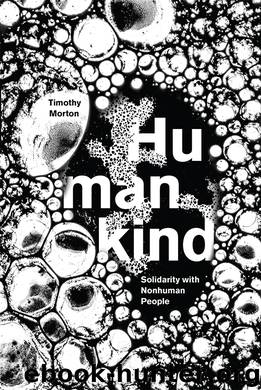Humankind by Timothy Morton

Author:Timothy Morton
Language: eng
Format: epub
Publisher: Verso Books
3
Subscendence
It is believed that one cannot be more than man. Rather, one cannot be less!
—Max Stirner, The Ego and Its Own
Idris: Are all people like this?
The Doctor: Like what?
Idris: So much bigger on the inside.
—Doctor Who
‘‘The whole is greater than the sum of its parts.’’ This truism is one of the most profound inhibitors of world sharing. This kind of holism is a symptom of agricultural-age monotheism that we are still retweeting, even if we think we are atheists. Its belief format is evident in the way in which Gestalt psychology is misheard to be repeating it. Gestalt psychology argues that the whole is different than its parts, not greater than, yet this common misunderstanding persists among psychologists.1 We must find some tools to dismantle it. Why not rewrite holism such that the whole is always less than the sum of its parts? Let’s call it “subscendence.” We’ll go about proving this by examining some features of object-oriented ontology.
We should see things such as humankind as wholes that are less than the sum of their parts. Tim Morton is so many more things than just “human.” A street full of people is much more than just a part of a greater whole called “city.” It’s hard to locate contemporary megacities because we keep looking for something that totally incorporates its parts. Towns, villages and other formations are strung together in Java in such a way that only the volcanoes on that massive island prevent them from spreading everywhere. The only limit is a perceived threat to life. The string of dwellings isn’t even a megacity, it’s a hypercity, a city that is hardly a city at all. But precisely because of this less-than-a-city quality, a hypercity is beyond even the colossal size we associate with megacities such as Mexico City. Java’s hypercity and Mexico City are less than the sum of their parts. Parts of them—houses, regions of houses—keep on pouring out of them like ice cubes bursting through the paper bag they made wet.
Wholes subscend their parts, which means that parts are not just mechanical components of wholes, and that there can be genuine surprise and novelty in the world, that a different future is always possible. It is good to regard things such as capitalism as physical beings, not simply as fictions that would disappear if we just stopped believing in them. But what kind of physical being are they? If they are subscendent, it means that we can change them, if we want. What if some things could be physically huge, yet onto-logically tiny? What if neoliberalism, which envelopes Earth in misery, were actually quite small in another way, and thus strangely easy to subvert? Too easy for intellectuals, who want to make everything seem difficult so they can keep themselves in a job by explaining it, or outdo each other in competition for whose picture of the world is more depressing. “I am more intelligent than you because my picture of neoliberalism is far more terrifying and encompassing than yours.
Download
This site does not store any files on its server. We only index and link to content provided by other sites. Please contact the content providers to delete copyright contents if any and email us, we'll remove relevant links or contents immediately.
| Anthropology | Archaeology |
| Philosophy | Politics & Government |
| Social Sciences | Sociology |
| Women's Studies |
The remains of the day by Kazuo Ishiguro(8999)
Tools of Titans by Timothy Ferriss(8394)
Giovanni's Room by James Baldwin(7346)
The Black Swan by Nassim Nicholas Taleb(7129)
Inner Engineering: A Yogi's Guide to Joy by Sadhguru(6794)
The Way of Zen by Alan W. Watts(6614)
The Power of Now: A Guide to Spiritual Enlightenment by Eckhart Tolle(5781)
Asking the Right Questions: A Guide to Critical Thinking by M. Neil Browne & Stuart M. Keeley(5775)
The Six Wives Of Henry VIII (WOMEN IN HISTORY) by Fraser Antonia(5515)
Astrophysics for People in a Hurry by Neil DeGrasse Tyson(5189)
Housekeeping by Marilynne Robinson(4447)
12 Rules for Life by Jordan B. Peterson(4304)
Ikigai by Héctor García & Francesc Miralles(4274)
Double Down (Diary of a Wimpy Kid Book 11) by Jeff Kinney(4272)
The Ethical Slut by Janet W. Hardy(4251)
Skin in the Game by Nassim Nicholas Taleb(4248)
The Art of Happiness by The Dalai Lama(4130)
Skin in the Game: Hidden Asymmetries in Daily Life by Nassim Nicholas Taleb(4006)
Walking by Henry David Thoreau(3962)
